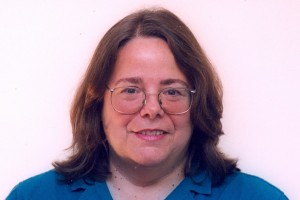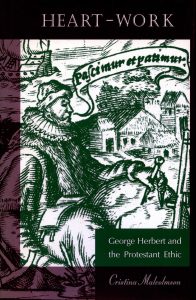Malcolmson, Cristina
Tribute to retiring Professor of English Cristina Malcolmson, by her colleague Associate Professor of English Sanford Freedman, on May 2, 2016
I first met Cristina Malcolmson, then of Yale University, in 1991 as she waited for a down elevator at The Blackstone hotel in Chicago. I introduced myself to her as someone on the search committee at Bates College and told her that because of scheduling, I was fearful of not being able to interview her.
We are saddened by the passing of Professor of English Emerita Cristina Malcolmson in July 2020 at age 70. We send our condolences to her family, friends, colleagues, and many former students.

Call it luck or insight, but in one long moment I knew by her brilliant wit, her generosity, and her openness that she was the very person I most desired to see at Bates. And countless colleagues, students, administrators afterward have affirmed the same. What a treasure it has been for Bates to have Cristina Malcolmson as a member of this community.
Tina earned her undergraduate degree at the University of California, Berkeley, in 1973, majoring in English. She attained her Ph.D. in English from Berkeley in 1983.
She taught at Berkeley as an instructor, then as an assistant professor at Reed College and Yale University, and lastly, as assistant, associate, and professor at Bates College, twice serving as chair of the Department of English and once as chair of the Program in Women and Gender Studies [now the Program in Gender and Sexuality Studies].
Tina has served more than and beyond the essential needs of the English department and of women and gender studies. Her scholarship allowed Bates to offer cutting-edge work in early modern gender, race, and religion as her courses in colonialism, early modern science, and pre-1800 women writers, in addition to surveys of 16th- and 17th-century English literature, opened up the period’s complex politics of empire and discovery, its transgressive representations of gender and sexuality, and its fascinating experiments in literary production.
“Tina never sided with one or the other by saying ‘you’re right, you’re wrong.’ She made us seek out the answers on our own.”
All these intellectual endeavors represent areas of study where Tina honed the analytic skills of department majors and others outside the major who were drawn to study with her. As a student from her famous, eagerly sought seminar on Edward Said’s Orientalism recently remarked to me: “Of course the material sparked great debate and students were aligned often on two sides, but Tina never sided with one or the other by saying ‘you’re right, you’re wrong.’ She made us seek out the answers on our own.”
Students were enthralled by Tina’s courses. As Tina listened to students, and she listened ardently, she often wrote notes to capture accurately that student’s point of view; that she was vigorous in this way in her note taking impressed her students all the more. She often complimented her classes for what they had achieved; she led discussion masterfully, whether it was about Othello, Oroonoko, or George Herbert, never losing an opportunity to advance a feminist insight or to speak of the importance of academic fairness. And donuts always appeared on the last day of class — for all.
Tina’s three books and one edition have been major contributions to their fields:
Heart-Work: George Herbert and the Protestant Ethic (Stanford: Stanford University Press, 1999). The book examines the relationship between the Protestant doctrine of vocation and Herbert’s models of religious interiority.

George Herbert: A Literary Life (Basingstoke: Palgrave Macmillan, 2004). This literary biography outlines the social and political contexts of George Herbert.
Studies of Skin Color in the Early Royal Society: Boyle, Cavendish, Swift (Aldershot: Ashgate, 2013). Shortlisted for the 2013 British Society for Literature and Science Book Prize, the book typifies Tina’s wonderful scholarship, as she looks at how both scientists and imaginative writers of the early modern period talk about race.
The Amazon by Edward Herbert, edited with Eugene Hill and Matteo Pangallo ’03, for The Malone Society Collections XVII (Manchester: Manchester University Press, 2016).
Ten of her article-length essays appear in Debating Gender in Early Modern England: 1500–1700; Renaissance Poetry; Oxford Bibliographies Renaissance and Reformation; History of British Women’s Writing; Slavery & Abolition; The International Journal of Science in Society; George Herbert’s Pastoral: New Essays on the Poet and Priest of Bemerton; Divisions on a Ground: Essays on English Renaissance Literature in Honor of Donald M. Friedman; Humans and Other Animals in Eighteenth-Century Britain: Representation, Hybridity, Ethics; Fault Lines and Controversies in the Study of Seventeenth-Century Literature; The Matter of Difference: Materialist Feminist Criticism of Shakespeare; Revenge Tragedy; Renaissance Women Online; Enclosure Acts: Sexuality, Property and Culture in Early Modern England; Attending to Women in Early Modern England; George Herbert in the Nineties: Reflections and Reassessments; and Studies in Philology.
Tina authored 12 reviews for such publications as Shakespeare Quarterly; Early Modern Women; The Historian; Early Modern Literary Studies; Modern Philology; George Herbert Journal; Clio: A Journal of Literature, History, and the Philosophy of History; Journal of English and Germanic Philology; and the Yearbook of English Studies.
Tina has participated as a panelist in 48 panel discussions in Berlin; Los Angeles; Brunswick, Maine; Amherst, Mass.; multiple MLA conferences across the U.S.A.; Lund, Sweden; Glasgow, Scotland; Dearborn, Mich.; Gregynog Hall, Wales; San Diego; Cambridge, England; and 35 other states and provinces.
She has served as a scholarly evaluator for Social History of Medicine; Modern Philology; Shakespeare Quarterly;Clio; The Norton Shakespeare, and the National Science Foundation. She has also been examiner for Idaho State University, the University of Connecticut, the University of Miami, and Lafayette College.
She has been lauded with awards and prizes, nine faculty development grants, a visiting fellowship at the University of London, a senior scholar at residence at Cornell University, a Phillips Fellowship, a Lincoln and Gloria Ladd Research Fellowship, the President’s Discretionary Fund Award, a Roger Schmutz Faculty Research Award, a Mellon Fellowship, the Griswold Research Fund, Regents University Fellowship, and a McGinty Research Fund Award.
Tina has taught 20 different courses during her time at Bates, such as the seminar “Orientalism,” “The Tudor Myth on Stage and in the Movies,” “Politics and the Theater,” “Shakespeare: Race and Gender,” “Feminisms,” “The Love Lyric and Society,” “Colonialism and Literature in Early Modern England,” “Pre-1800 Women Writers,” “NewsWatch,” “English Literary Renaissance,” “Seventeenth-Century Literature,” and “Sexual Harassment and the U.S. Senate’s Thomas-Hill Hearings.” And she team-taught five different courses with five different instructors.
In fall 2016, Tina will be at Cornell University as a Senior Scholar in Residence, Society for the Humanities. In 2017 she will host at Bates the International Margaret Cavendish Society, which will bring a large international array of scholars to campus. Tina’s book Studies of Skin Color in the Early Royal Society, is the subject matter of that conference.
Finally I draw attention to important moments in Bates College legislation where Tina played a significant role in directing the faculty. In May 2009, she brought to the notice of the faculty Article III, Section 1b, of the Faculty Handbook, which at that point read, “Special meetings of the faculty may be called at the discretion of the president. The president shall also call a special faculty meeting at the written request of 10 members of the faculty.” Although the wording of this measure has changed, that article has been used more than once to good effect — and we all have Tina to thank.
Furthermore, Tina, working with colleague Leila Kawar, developed programming in March 2011 addressing anti-Islamic and anti-Arab prejudice at Bates, and spoke on the panel “How Much Hate is Acceptable at Bates: Rick Santorum, Islamophobia, and Hate Speech” in May 2011.
Last and finally last, that same woman who came to Bates 25 years ago, that same person who showed such poise and command before all of Herbert’s prose and poetry, that scholar who sought out in all her students their thoughts before the literature, that person who has taught us all of us never to relinquish the drive to demand justice and equality for those who are downtrodden — and who herself was taught that by Carole Taylor — that Cristina Malcolmson, who is the very epitome of academic energy and honesty that we all strive for, here she is, today, so that we might justly celebrate her.